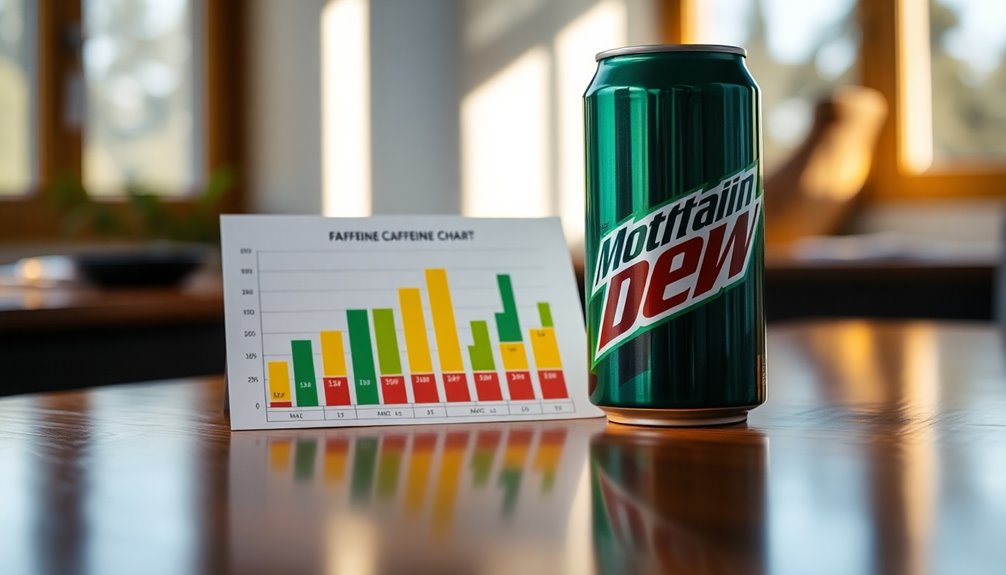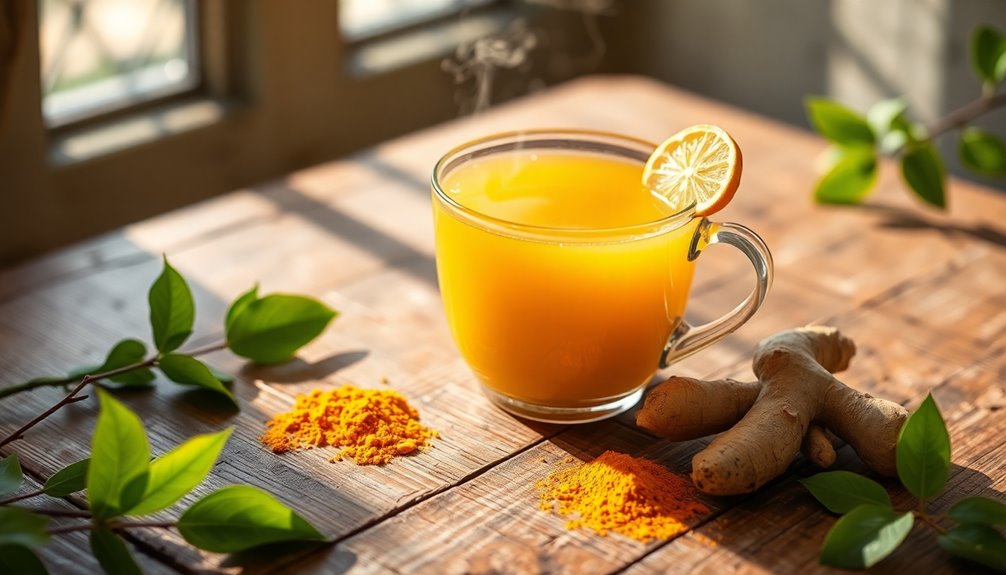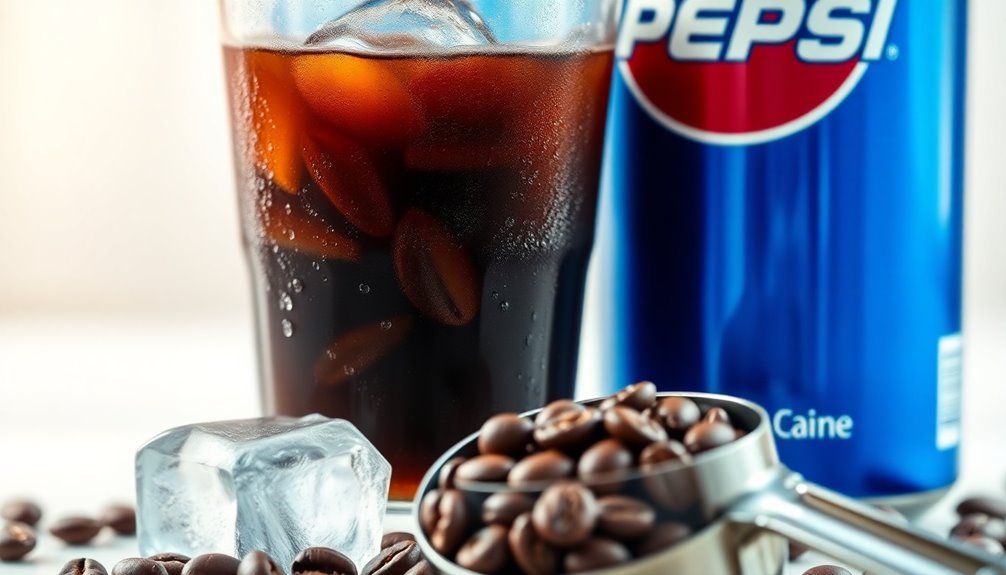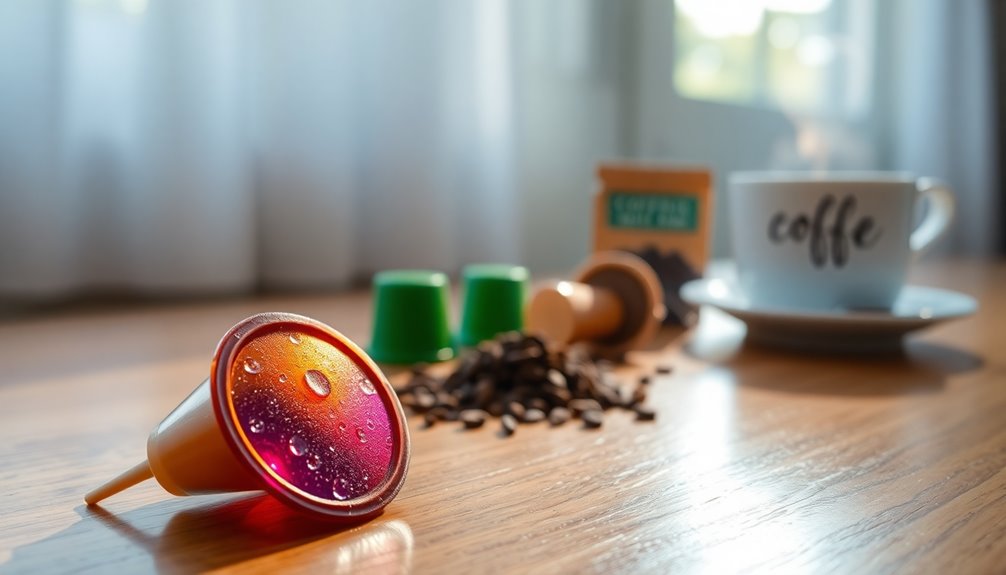Mountain Dew's caffeine content varies depending on the type. A regular 12 oz can packs about 55 mg of caffeine, while an 8 oz serving has roughly 37 mg. If you're looking for a boost, Mountain Dew Energy has a whopping 180 mg in 16 oz. For those who prefer less caffeine, Mountain Dew Zero Sugar contains only 5.7 mg in 12 oz. Caffeine-Free Diet Mountain Dew has none at all. It's important to know these amounts so you can manage your intake effectively. Stick around, and you'll discover more about your favorite drinks and their effects on your health.
Key Takeaways
- Regular Mountain Dew contains 55 mg of caffeine per 12 oz can.
- Mountain Dew Zero Sugar has only 5.7 mg of caffeine in a 12 oz serving.
- Mountain Dew Energy delivers 180 mg of caffeine in a 16 oz can.
- Mountain Dew Game Fuel provides approximately 90 mg of caffeine per 16 oz.
- Caffeine-Free Diet Mountain Dew contains 0 mg of caffeine.
Caffeine Levels in Mountain Dew
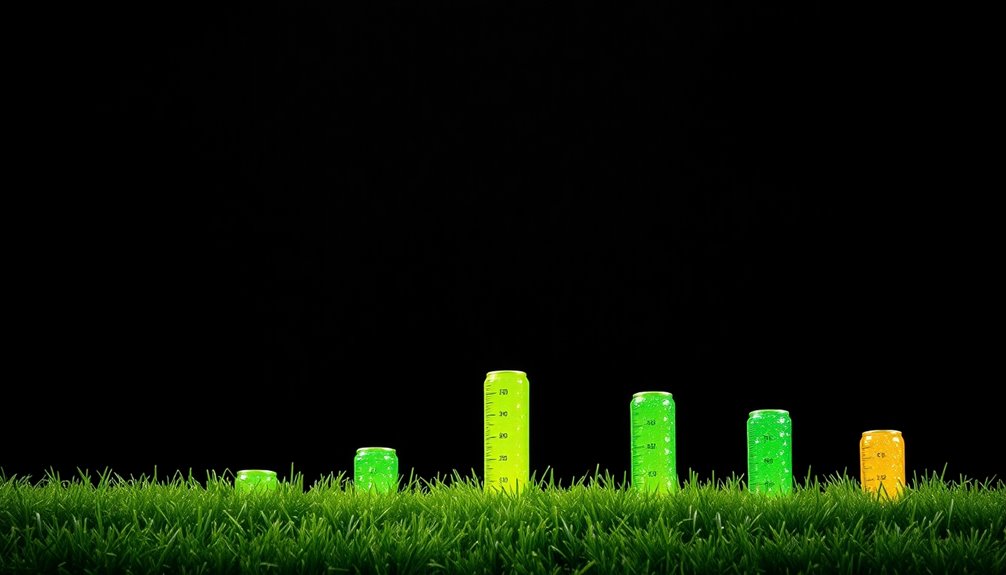
Have you ever wondered how much caffeine is in Mountain Dew? A regular 12 oz can packs about 55 mg of caffeine, which gives you a nice boost without being overwhelming.
If you're looking for a smaller serving, an 8 oz portion contains approximately 37 mg. However, if you prefer to skip caffeine altogether, there's Caffeine-Free Diet Mountain Dew with zero caffeine.
Keep in mind that different Mountain Dew flavors can have varying levels of caffeine. For instance, Mountain Dew Amp can have up to 142 mg per 16 oz serving!
This moderate caffeine in Mountain Dew is one reason why it remains popular among soft drink enthusiasts, offering a unique flavor without excessive stimulation.
Mountain Dew Variations

When it comes to Mountain Dew, you've got plenty of variations to choose from, each with unique caffeine levels.
Whether you're looking for a healthier alternative or curious about some discontinued flavors, there's something for everyone.
Let's explore how these options stack up against each other!
Caffeine Levels by Flavor
While enjoying a cold can of Mountain Dew, you might be curious about the varying caffeine levels across its different flavors.
Regular Mountain Dew offers 55 mg of caffeine content per 12 oz can, making it a moderate option for soda lovers.
If you're after something stronger, Mountain Dew Energy packs a punch with 180 mg of caffeine in a 16 fl oz serving.
Mountain Dew Amp follows closely with 142 mg in the same size.
For those looking to enjoy a game, Mountain Dew Game Fuel features flavors that typically contain around 90 mg of caffeine per 16 oz.
On the other hand, if you're cutting back, Mountain Dew Zero Sugar has just 5.7 mg in a 12 oz can.
Healthier Alternatives Available
If you're looking for healthier alternatives to traditional Mountain Dew, several variations cater to different preferences and dietary needs.
These options can help you manage your caffeine intake while still enjoying a flavorful beverage.
- Mountain Dew Kickstart: Contains about 92 mg of caffeine in a 16 fl oz can and is lower in calories than regular Mountain Dew.
- Mountain Dew Zero Sugar: With only 5.7 mg of caffeine in a 12 fl oz serving, it's a great low-calorie choice.
- Mountain Dew Game Fuel: Offers a low-calorie alternative with varying caffeine content by flavor, perfect for health-conscious consumers.
Explore these options to find the right balance between taste and health!
Discontinued Variants Overview
Mountain Dew has offered a variety of flavors and formulations over the years, some of which have come and gone, leaving fans with fond memories.
Discontinued variants like Mountain Dew Black Label contained 83 mg of caffeine in a 16 fl oz serving, while Mountain Dew Kickstart Hydrating Boost featured 68 mg of caffeine per 12 fl oz, providing a revitalizing option.
Mountain Dew Spiked targeted those seeking an alcoholic alternative with 72 mg of caffeine in a 16 fl oz bottle. Additionally, Mountain Dew Ultra Violet offered 54 mg of caffeine in a 12 fl oz serving.
These discontinued flavors contribute to nostalgia among consumers, showcasing how Mountain Dew contains diverse and experimental options that once excited fans.
Caffeine Comparison With Other Beverages

How does Mountain Dew's caffeine content stack up against other popular beverages? A 12 oz can of regular Mountain Dew contains 55 mg of caffeine, putting it on the higher end among sodas but still moderate compared to other drinks.
Here's how it compares:
- Coffee: An 8 oz cup packs 80-100 mg of caffeine, much more than Mountain Dew.
- Energy Drinks: These can exceed 300 mg per serving, making them considerably stronger.
- Soda Varieties: Coca-Cola has about 35 mg, and Pepsi contains roughly 38 mg, both lower than Mountain Dew's caffeine.
Health Risks of Caffeine
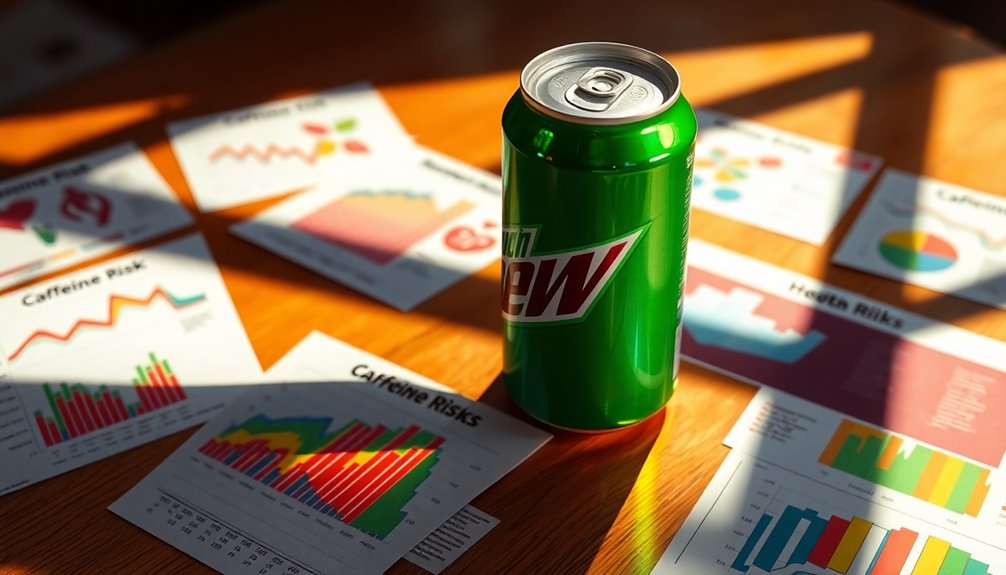
Caffeine consumption, including that from beverages like Mountain Dew, can carry health risks that vary from person to person.
While most adults can safely consume up to 400 mg of caffeine daily, your tolerance may differ. Excessive caffeine intake can lead to insomnia, increased heart rate, anxiety, and even an upset stomach.
If you're pregnant, it's wise to limit caffeine to under 200 mg per day to reduce risks of miscarriage and birth defects. Long-term overconsumption can create dependence and withdrawal symptoms, making it hard to cut back.
Additionally, mixing caffeine-rich drinks with alcohol can mask intoxication effects and worsen dehydration. Being mindful of your caffeine intake can help you avoid these potential health issues.
Caffeine Content in Snacks and Treats
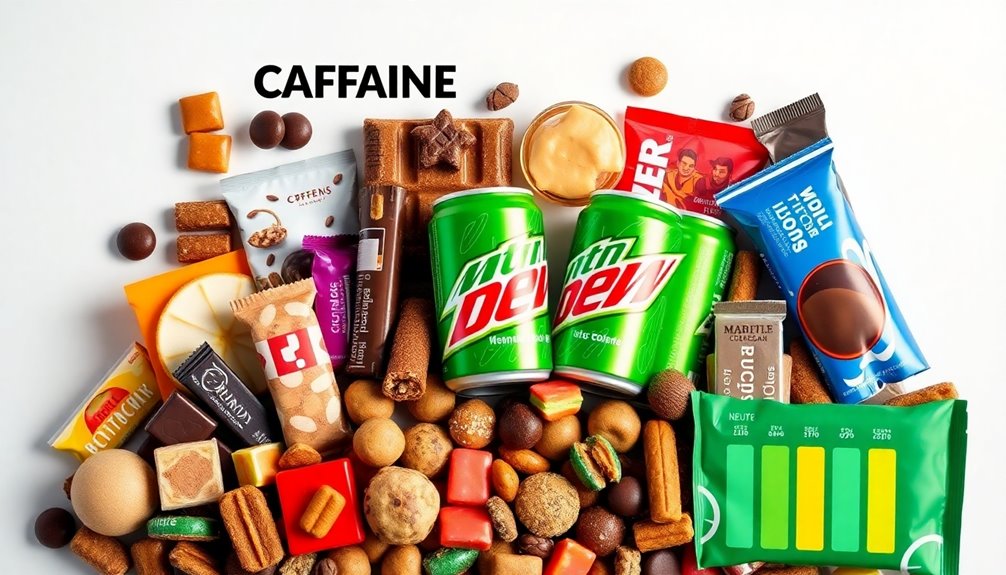
When you reach for a snack, you mightn't consider the caffeine lurking in your treats.
Dark chocolate and energy bars can pack a surprising punch, often containing more caffeine than you'd expect.
It's crucial to check labels so you know exactly what you're getting and how it fits into your overall caffeine intake.
Caffeinated Snack Options
Have you ever thought about the variety of caffeinated snacks available to boost your energy?
Caffeine-infused snacks can provide a delicious way to enhance your alertness throughout the day. Here are some tasty options to think about:
- Chocolate-covered espresso beans: About 100 mg of caffeine per ounce.
- Caffeinated gum: Roughly 40 mg of caffeine per piece for a quick boost.
- Energy bars: Typically contain between 50 to 100 mg of caffeine per serving, depending on the brand.
Keep in mind the importance of being aware of caffeine content in snacks, as many products don’t clearly label their levels. It’s crucial to read the labels carefully, especially if you have a low tolerance for caffeine or if you’re monitoring your intake. Some snacks that you may not expect to contain caffeine, such as chocolate or certain energy bars, can actually have high levels. Additionally, it’s important to be mindful of the caffeine content in Pepsi, as it can vary depending on the specific product or flavor. Always check the nutritional information to make informed choices about your caffeine intake.
This awareness helps you manage your overall caffeine intake while enjoying these treats!
Chocolate Caffeine Content
If you're exploring caffeinated snacks, chocolate is a popular choice that packs a punch. The caffeine content in chocolate varies depending on the type.
Dark chocolate typically contains about 20-30 mg of caffeine per ounce, while milk chocolate offers a milder 5-10 mg. If you want the highest kick, opt for baking chocolate, which has around 25-35 mg per ounce. In addition to its caffeine content, chocolate also provides a variety of health benefits, particularly in its dark and baking forms. For those curious about nutrition, you might wonder how much protein in cacao powder; it can vary but generally contains about 3-4 grams of protein per tablespoon. This makes cacao powder a great addition to smoothies and baked goods for those looking to boost their protein intake while enjoying the rich flavor of chocolate.
White chocolate, however, is fundamentally caffeine-free. Don't forget about chocolate-covered coffee beans; each bean can deliver about 15 mg of caffeine.
Additionally, if you're munching on chocolate-based energy snacks, check the labels, as they may have added caffeine. Even chocolate ice cream contains some caffeine, averaging about 4-6 mg per serving, making it a lighter option.
Health Considerations for Consumers

While enjoying a can of Mountain Dew, it's important to reflect on the potential health implications of its high sugar and caffeine content. With 46 grams of sugar per 12 oz can, you're exceeding the American Heart Association's recommended limits.
Pregnant women should also be cautious, as the 55 mg of caffeine can impact their daily intake. Regular consumption may lead to caffeine dependence and withdrawal symptoms, a crucial factor in today's brews and caffeine news.
Here are some key points to keep in mind:
- Be mindful of your total caloric intake; a can packs 170 calories.
- High sugar and caffeine can worsen dehydration, especially with alcohol.
- Monitor your consumption to avoid health complications down the line.
- Additionally, understanding caffeine dependence can help you make informed choices about your beverage consumption.
Where to Buy Mountain Dew

Finding Mountain Dew is easy, thanks to its wide availability in both physical and online stores. You can grab it from local grocery stores or order it conveniently online. Here's a quick overview of options where to buy Mountain Dew:
| Product Description | Price |
|---|---|
| Mountain Dew Mini Cans (Pack of 10) | $5.98 |
| Mountain Dew Game Fuel Variety Pack (18) | $15.98 |
| Mountain Dew Soda (Pack of 24) | $24.49 |
Online platforms like Amazon provide a variety of Mountain Dew products, catering to different preferences and serving sizes. Just remember that prices and availability may vary, so it's wise to check both Amazon and your local retailers for the best deals.
About Caffeine and Its Effects
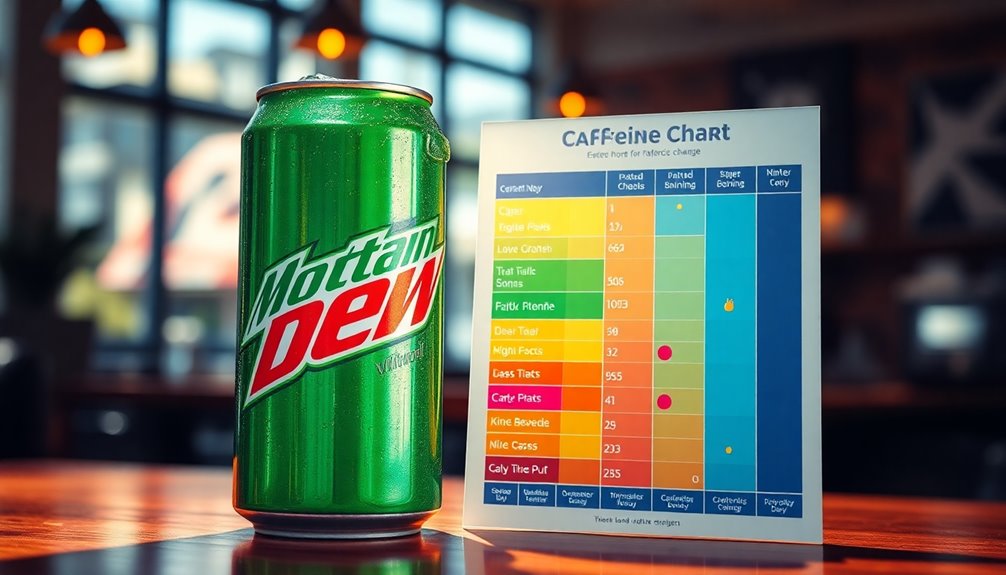
Mountain Dew isn't just known for its vibrant flavor; it also contains caffeine, a natural stimulant that can enhance energy levels and alertness.
While moderate caffeine consumption of up to 400 mg daily is generally safe, you should be aware of your personal tolerance.
Keep these points in mind when enjoying caffeine:
- Regular intake can lead to dependence, with withdrawal symptoms if you suddenly stop.
- Caffeine may disrupt your sleep patterns, so know your limits for good sleep health.
- Overconsumption can cause increased heart rate, anxiety, and upset stomach.
Understanding how caffeine affects you is essential for maintaining your well-being while enjoying your favorite beverages like Mountain Dew!
Frequently Asked Questions
What Has More Caffeine, Coffee or Mountain Dew?
When you compare coffee and Mountain Dew, you'll find that coffee generally has more caffeine.
A typical 8 oz cup of coffee contains around 80-100 mg of caffeine, while a 12 oz can of Mountain Dew has about 55 mg.
This means if you're seeking a stronger caffeine boost, coffee's your better choice.
However, Mountain Dew still packs a moderate caffeine punch compared to many other sodas, so it's not without its perks.
Which Soda Has the Most Caffeine?
When you're looking for the soda with the most caffeine, you'll want to check out energy drinks or specialty sodas.
Generally, energy drinks like Monster can pack over 160 mg of caffeine per serving, making them the highest in caffeine among popular drinks.
Traditional sodas, like Mountain Dew, have less, with around 55 mg per 12 oz can.
How Much Caffeine Is in a 20 Oz Mountain Dew?
Ever wondered how that burst of energy in a 20 oz Mountain Dew feels?
You're looking at about 91 mg of caffeine in that bottle. It's enough to give you a nice boost, especially when you need to power through your day.
Just keep in mind, while you enjoy that invigorating taste, you're also consuming 77 grams of sugar.
What Drink Has the Highest Caffeine?
When you're looking for the drink with the highest caffeine content, energy drinks are usually the top contenders.
Brands like Bang and Reign can deliver up to 300-350 mg of caffeine per 16 oz serving, while Monster Energy offers around 160 mg in a 12 oz can.
If you prefer coffee, Starbucks' Grande packs a hefty 330 mg in 16 oz.
Conclusion
In the grand scheme of thirst-quenching delights, Mountain Dew offers a bubbly burst of caffeine that can perk you up. Just remember, while it's a zesty companion for your adventures, moderation's the key to keeping your energy soaring without any pesky jitters. So, whether you're tackling a project or enjoying a night out, savor your Dew with a smile and stay mindful of your caffeine journey. After all, life's too short not to enjoy the fizzy moments!
